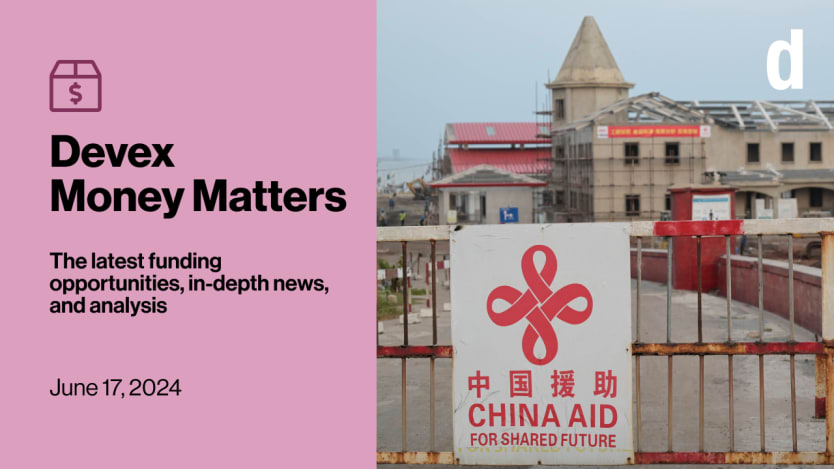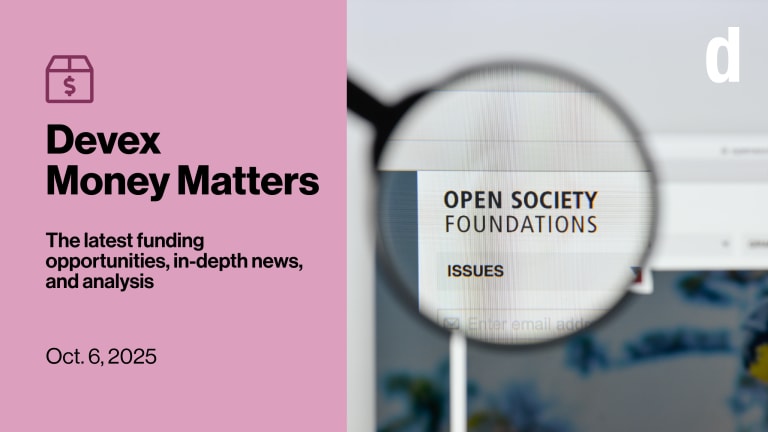
The pool of donor countries is gradually expanding. Although official development assistance remains dominated by the Group of Seven major economies, there are more and more countries contributing aid. We look at some of the fastest-growing donors.
+ Are there topics you want to read more about in Money Matters? We want your feedback.
Growing giving
Historically, the world of aid has been dominated by a handful of countries. Just five donors account for more than 60% of all aid. But as more economies transition to higher levels of income, new donors are emerging.
A soon-to-be-published Devex report will profile selected key donors in depth.
This is a preview of Devex Money Matters
Sign up to this weekly newsletter and get the latest in development funding in your inbox every Monday.
Broadly, these emerging donors fall into three groups: the fast-growing and powerful economies of the BRICS bloc, the wealthy Gulf States, and larger European economies that have been pushed into giving more in response to refugee crises. Yet of the countries we profile, only one — Poland — has so far joined the Development Assistance Committee, the official club of ODA donors.
Today, we’ve produced a preview of that report exclusively for our Pro members.
Read: Emerging donors — and where they spend their aid (Pro)
+ Interested in more funding and aid coverage? Explore our funding insights page. If you aren’t a Devex Pro member yet, start your 15-day free trial now to access all our exclusive reporting, analyses, events, and more.
Funding activity
We publish tenders, grants, and other funding announcements on our Funding Platform. Here are some of the ones which have been viewed the most in the past 10 days.
The Asian Development Bank has approved a $150 million loan focused on the development of micro, small, and medium-sized enterprises in rural Thailand.
The African Development Bank is currently looking for a service provider to conduct capacity-building training for government institutions in South Sudan.
The U.S. Department of State has a $1 million open competition for proposals that support youth leadership and participation in the Solomon Islands.
USAID announced $315 million in additional humanitarian assistance to support the people affected by the humanitarian crisis in Sudan.
The World Bank has approved a $150 million project to increase the participation rates of youth to enhance the learning outcomes in Pakistan.
The World Food Programme is actively seeking project proposals from NGOs to support and promote smallholder agriculture transformation to modern commercial farming in Tanzania.
+ Try out Devex Pro Funding today with a free five-day trial, and explore funding opportunities from over 850+ sources in addition to our analysis and news content.
Will the U.K. go back to 0.7%
We’re continuing to closely track the debate around the U.K. general election, and particularly the commitments from the Labour Party, which is widely expected to win a landslide victory. There’s long been disagreement within Labour about how hard to push on aid, and whether to reverse spending cuts implemented by the Conservative incumbents during the pandemic.
Unfortunately for development workers, the Labour manifesto, released last week, contains little to smile about.
UK election: Labour rules out aid department or early return to 0.7% (Pro)
+ Your Pro membership lets you get the most out of our coverage of the U.K. aid sector.
Health partnerships
Three of the world’s richest foundations have formed a $300 million research partnership to tackle the linked impacts of climate change, malnutrition, infectious disease and antimicrobial resistance, in low- and middle-income countries.
The Gates Foundation, Wellcome, and the Novo Nordisk Foundation will each provide $100 million over three years. It’s the first time the three funders have all worked together.
As yet, it’s not clear which organizations are likely to receive the funds, but Devex will continue to watch and bring you updates.
Read: How a $300M global health partnership will work
Bonn chance
Climate funding has long been a sticking point in the world of development. Wealthy nations originally committed to provide $100 billion of finance by 2020. But when they finally hit the target, two years late, campaigners identified that almost two-thirds of the money that had been committed between 2013 and 2021 had either never been disbursed, or had little to do with climate.
Government representatives gathered in Bonn last week to discuss the agenda for this year’s United Nations Climate Change Conference, and finance was once again on the agenda. That’s because governments must now set a new, more ambitious climate funding target.
The figure needed is estimated to be around $2.4 trillion. The goal will be way lower than that, but how much lower is still to be figured out; nations appear to have emerged from Bonn still far from a consensus.
Read: Why climate finance is at heart of key UN conference this week (Pro)
Sign up to Money Matters for an inside look at the biggest stories in development funding.








